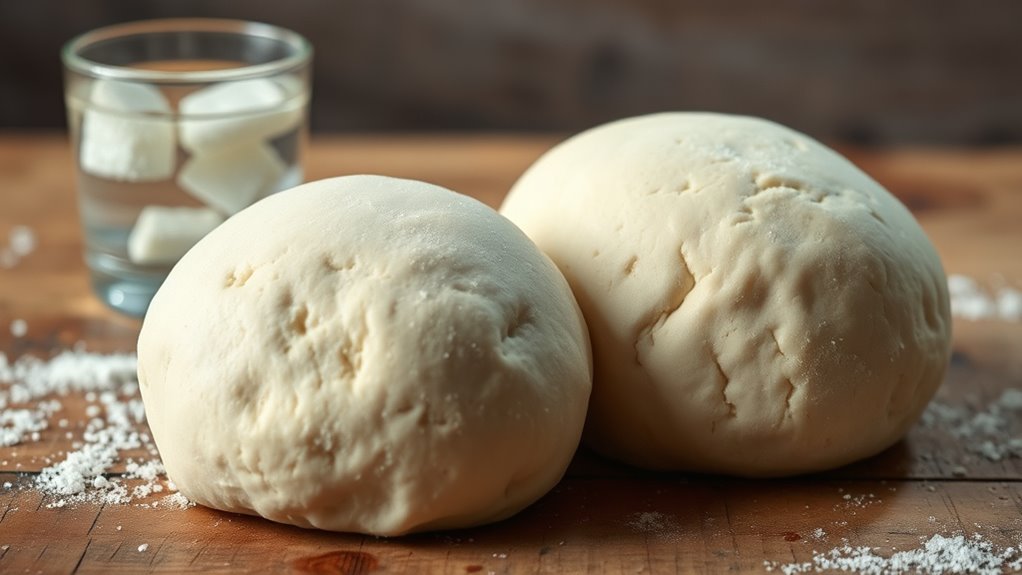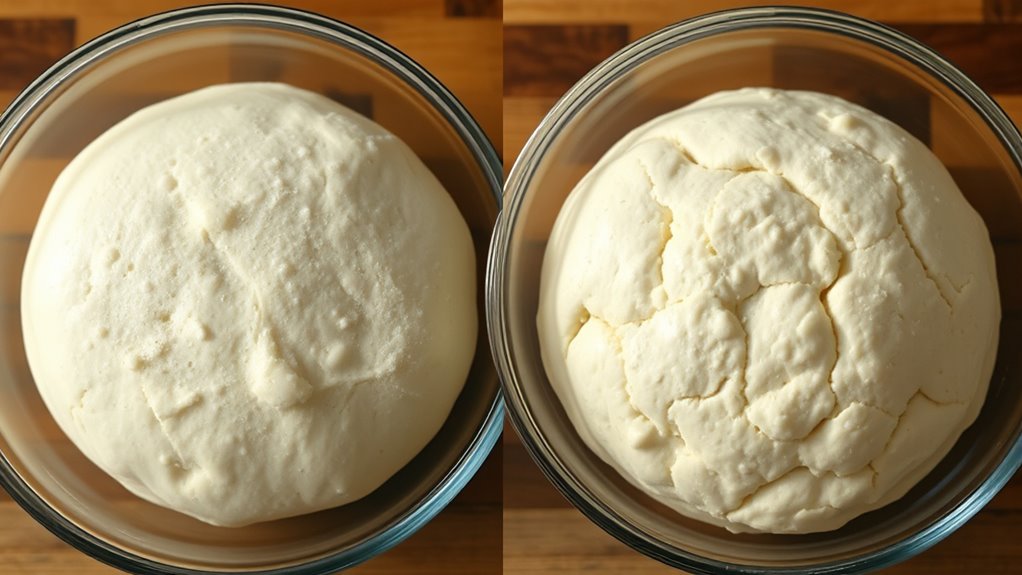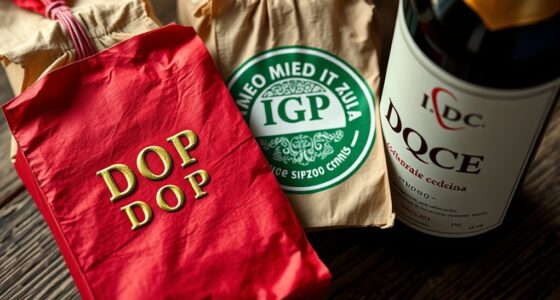Water hardness impacts your pizza dough by influencing fermentation speed, gluten development, and flavor. Hard water, rich in calcium and magnesium, accelerates yeast activity and strengthens gluten, leading to a more elastic dough and faster rise. Soft water may slow fermentation and produce softer dough with milder flavors. Balancing mineral content can help you control fermentation and achieve the perfect crust. Continue to explore how adjusting your water quality can improve your pizza baking results.
Key Takeaways
- Hard water accelerates fermentation by providing essential minerals that boost yeast activity.
- Increased mineral content strengthens gluten, improving dough elasticity and structure.
- Hard water enhances enzymatic reactions, promoting complex flavor development during fermentation.
- Soft water may slow fermentation and produce softer, less elastic dough with milder flavors.
- Adjusting mineral levels in water allows control over fermentation speed and dough quality.

Water hardness can considerably impact how your pizza dough ferments, as the mineral content influences yeast activity and gluten development. The mineral composition of your water—mainly calcium and magnesium levels—directly affects how quickly or slowly your dough ferments. Hard water, rich in these minerals, can accelerate fermentation by providing essential nutrients that boost yeast activity. Conversely, soft water, with fewer minerals, may slow down the fermentation process, leading to a different dough texture and flavor.
When you use hard water, the increased mineral content helps strengthen the gluten network within your dough. This improved gluten development results in better dough elasticity and structure, making it easier to shape and stretch. The minerals also serve as catalysts for enzymatic reactions during fermentation, which can speed up the yeast’s activity. As a result, your dough may rise more quickly and develop a more complex flavor profile due to the enhanced fermentation rate. However, too much mineral content can sometimes lead to overly rapid fermentation, causing the dough to overproof or develop undesirable flavors, so balance is essential.
On the other hand, soft water lacks sufficient minerals to support ideal yeast activity. This situation can lead to a slower fermentation rate, requiring longer proofing times to achieve the desired rise and texture. Without enough calcium and magnesium, the gluten strands may not develop as well, resulting in a softer, less elastic dough that’s more difficult to handle. The reduced enzymatic activity also means fewer flavor compounds are produced during fermentation, potentially resulting in a milder-tasting crust. Additionally, understanding your water’s mineral content can help you make targeted adjustments to optimize fermentation conditions.
If you’re aiming for consistent results, understanding your water’s mineral composition is vital. You might consider testing your water and adjusting it accordingly. For instance, if your water is too soft, adding minerals or using mineral-rich water can help improve fermentation. Conversely, if it’s too hard and causes overly rapid fermentation, you could dilute it or use filtered water with lower mineral levels. This awareness allows you to control the fermentation rate more precisely, ensuring your dough rises just right for perfect pizza crusts.
Frequently Asked Questions
Does Mineral Content Impact Yeast Activity During Fermentation?
Mineral content definitely impacts yeast activity during fermentation. When mineral interference occurs, it can hinder yeast activation, making your dough ferment slower or unevenly. Hard water, rich in calcium and magnesium, may interfere with yeast’s ability to produce carbon dioxide effectively. To improve fermentation, consider using filtered or soft water, which minimizes mineral interference, ensuring your yeast activates properly and your dough rises perfectly for delicious pizza.
Can Water Hardness Influence the Flavor of the Finished Pizza Crust?
Water hardness can influence the flavor profile of your finished pizza crust, as minerals like calcium and magnesium add subtle, earthy notes that enhance taste. It also affects texture, helping gluten development for a chewier, more satisfying crust. When your water is harder, these mineral interactions become more pronounced, giving your pizza a richer flavor and improved texture, making your homemade pizza even more delicious.
Are There Specific Water Treatments Recommended for Optimal Dough Fermentation?
It feels like a coincidence, but your water treatment choices truly impact your dough’s fermentation. To optimize, you should consider water filtration to remove impurities and mineral balancing to guarantee the right calcium and magnesium levels. These steps help create a stable environment for yeast activity, resulting in better dough rise and flavor. Properly treated water makes your pizza crust consistently delicious, releasing the full potential of your baking.
How Does Water Ph Interact With Hardness to Affect Dough Rise?
You should consider how pH balance interacts with mineral content, as both influence dough rise. Hard water’s minerals can raise pH levels, making the environment less acidic, which can slow fermentation. Conversely, softer water with lower mineral content maintains a better pH balance, promoting yeast activity. By managing mineral interactions and pH, you guarantee ideal fermentation, leading to a well-risen, flavorful pizza dough.
Is Softened Water Better Than Hard Water for Pizza Dough Fermentation?
Softened water is generally better for pizza dough fermentation because it offers a more stable mineral balance and consistent water pH. Hard water’s minerals can interfere with yeast activity, slowing fermentation. By choosing softened water, you guarantee ideal conditions for yeast to thrive, leading to better dough rise. You’ll notice a lighter, fluffier crust, as the balanced mineral content supports healthy fermentation without the negative effects of excess minerals.
Conclusion
Understanding how water hardness impacts your pizza dough fermentation is like revealing a secret ingredient. By adjusting your water’s mineral content, you hold the key to perfecting your crust’s texture and flavor. Don’t let hard or soft water be a mystery—embrace the science behind it. Remember, every great pizza starts with the right water. So, are you ready to transform your dough and elevate your pizza game? The choice is in your hands—literally!









